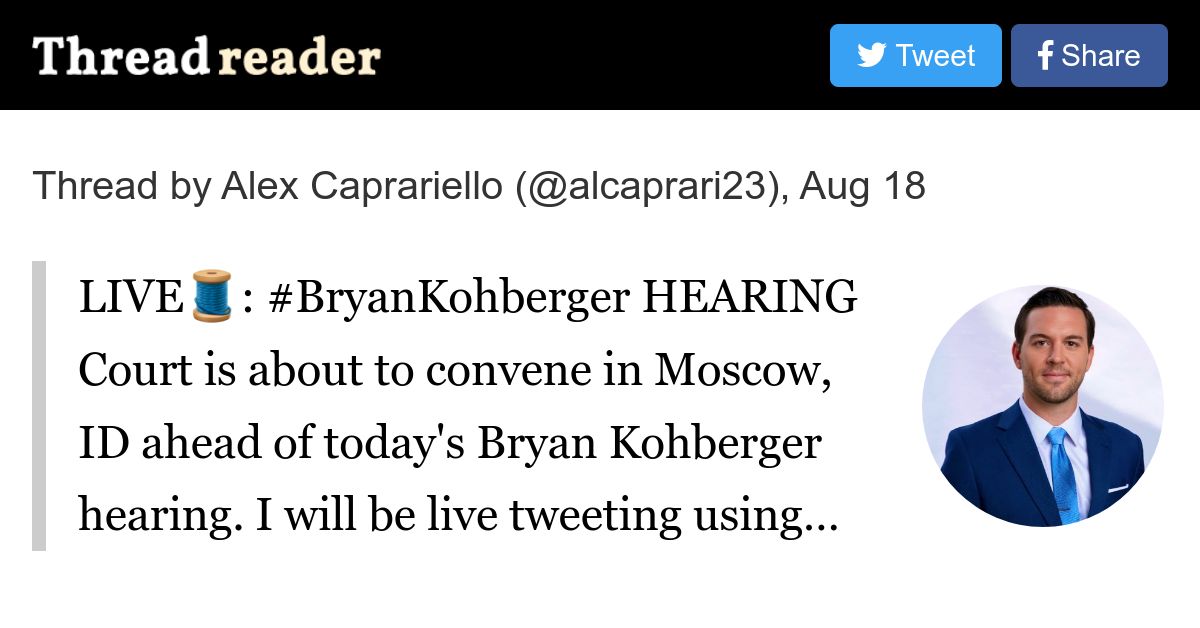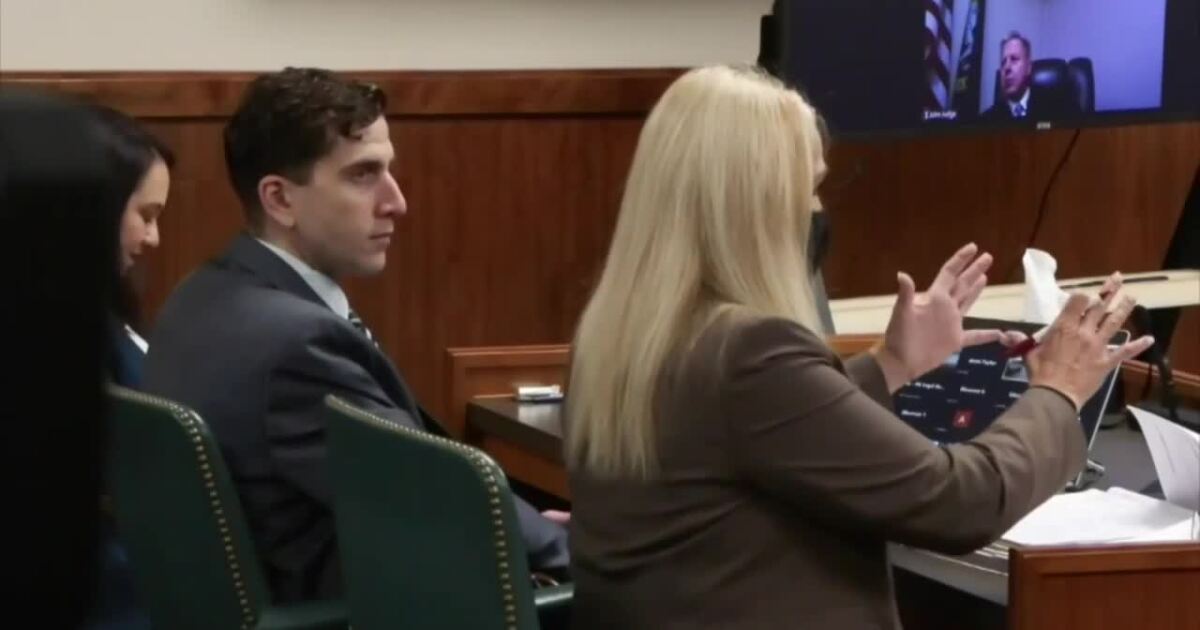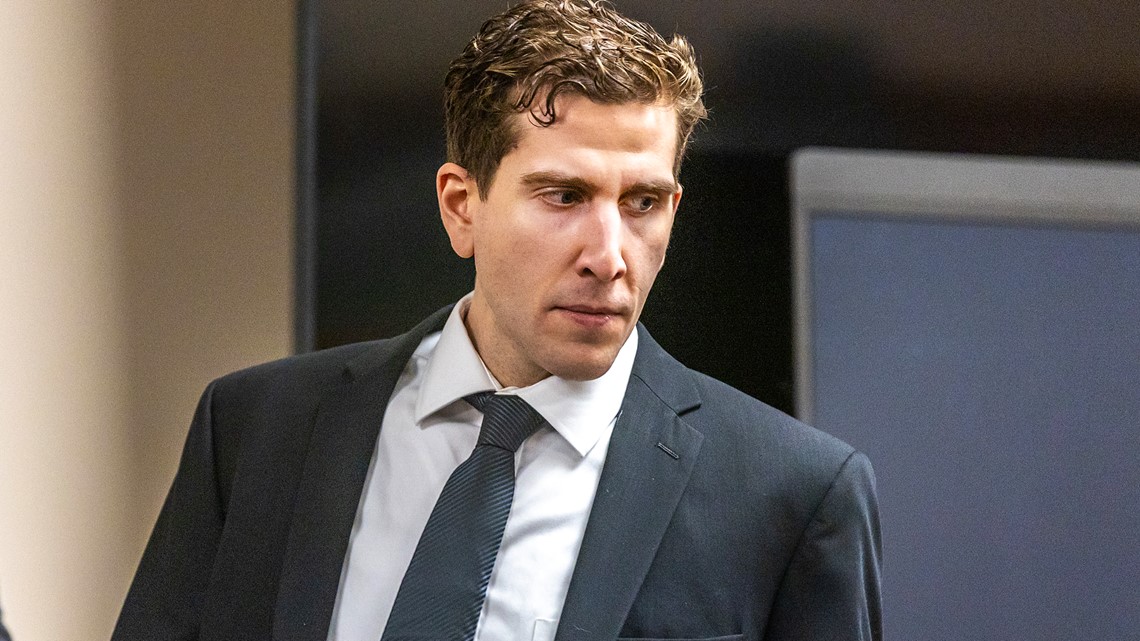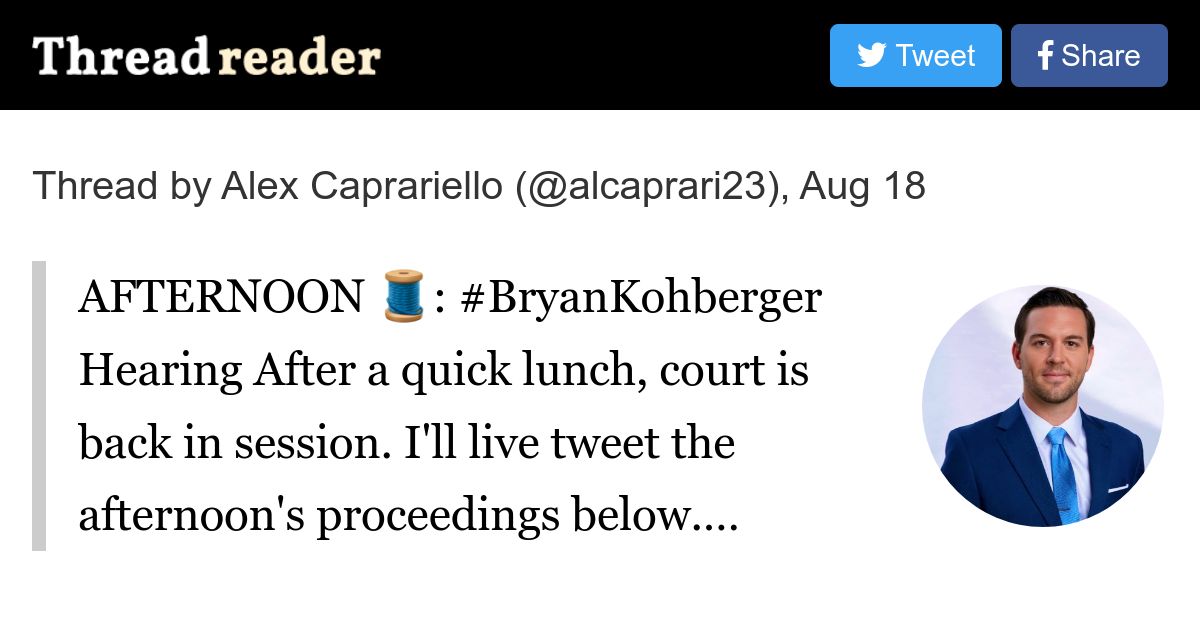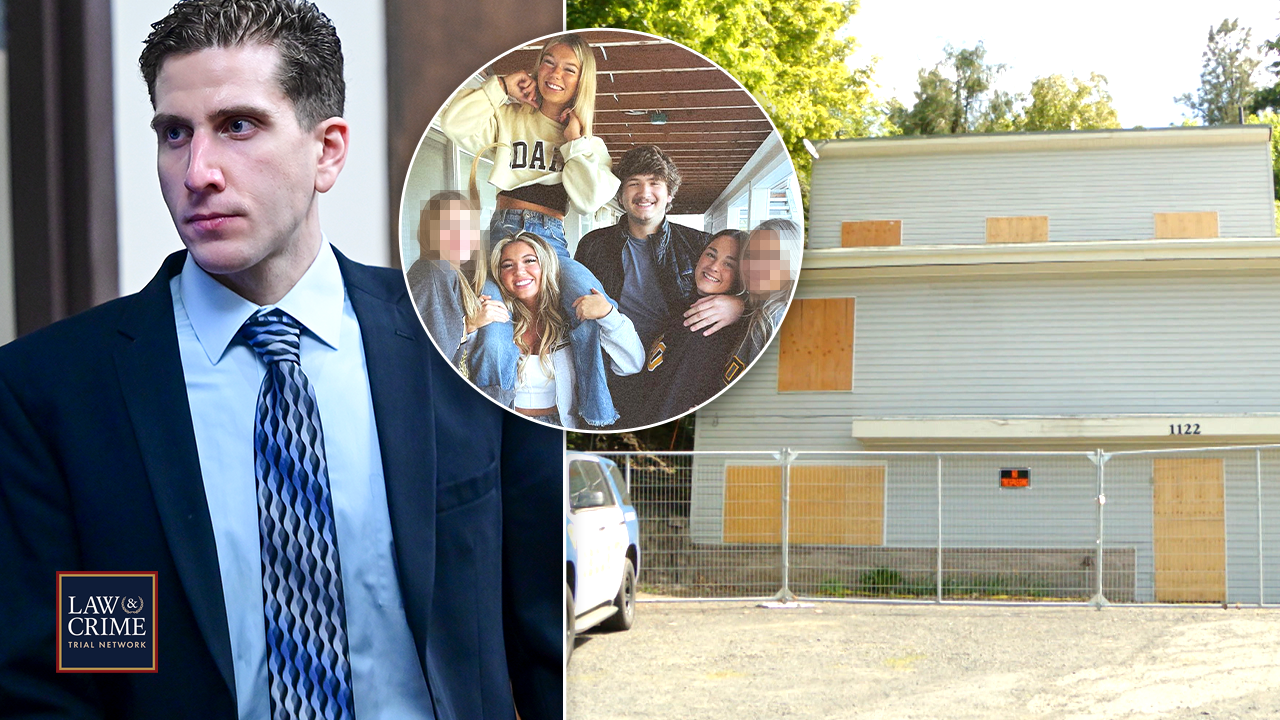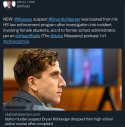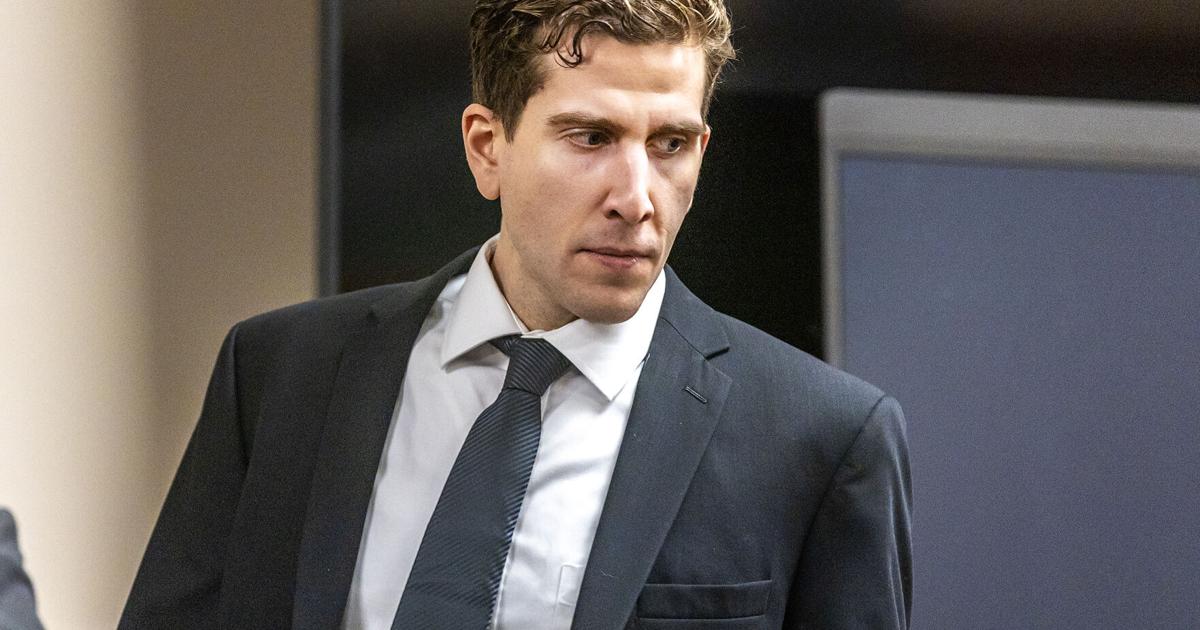Court is about to convene in Moscow, ID ahead of today's Bryan Kohberger hearing. I will be live tweeting using this thread below.
Court TV is our pool camera inside the courtroom today. There is no live feed available for other networks and affiliates, but that will be shared later today on
@NewsNation. We will also have liveshots throughout the day recapping today's hearing.
The courtroom is not at capacity, but it is more filled than previous hearings. The Goncalves family is in attendance alongside their attorney. Steve Goncalves told
@BanfieldonNN last night that he wants to monitor the hearing closely to make sure justice is served.
NOW:
#BryanKohberger and his defense team have entered the courtroom. Bryan is wearing a grey suit with a blue and gold striped tie. He entered the room calmly and did not appear to have much of an expression on his face. The judge has now taken his seat at the bench.
We are now on the record. Several motions are set for today. State's motions: protective order (investigative genetic genealogy DNA issue) which is related to defense's motion to compel. Also motion to reconsider speedy trial, motion to stay proceedings alleging irregularities in grand jury indictment, motion to compel defense of alibi, motion for scheduling order.
The defense will go first in discussing the motion to compel. There are witnesses expected to be called today. But first, some objections from the prosecution. State believes calling attorneys to testify about legal conclusions and discovery dispute is not proper. She says that Anne Taylor is an attorney and should be able to make the case without calling on fellow attorneys to testify as witnesses.
The defense says it's attorney witnesses are known to the state and have experience sharing with Idaho Courts. Defense claims prosecution knew that they were going to be called as witnesses for a long time, and that they have traveled to Moscow today for this specific reason and should be allowed to testify.
Defense says they are well versed in criminal defense and DNA genealogy. They will not be called as witnesses if this goes to trial, but are critical today when discussing DNA evidence and why it should be allowed into discovery for the defense's preparation of the case.
As for the CV witness, defense says the declaration has her background and training which speaks to her credibility. Acknowledges that the declaration only came in yesterday (which is "late"), but said it was for undisclosed reasons beyond their control.
Judge is concerned about opinions of constitutional law and procedures of discovery. Judge says Anne Taylor is capable of making those cases. But says that their expertise on genetic genealogy has merit. Says it would be "wise for him to allow it" on the record.
Judge says he doesn't want to get into arguments about law but wants to be able to hear from both sides. Judge denies the objections of the prosecution and will allow witness testimony.
Clarification on the defense's motion to compel: Defense does not have the lab results of the other three unidentified male DNA samples, two from within the house and one from outside the house. That is what they want. Prosecution says they have provided everything they have.
Judge: "There has to be some level of trust in discovery. You are all sworn attorneys. Mr. Thompson is saying there is one more lab report coming your way…”
Judge asks prosecution to reach back out to the lab and make sure there are no other existing documents and results that the defense does not have. Defense is adamant that the prosecution has given everything they have, and calls the pleas for more information "speculation."
Defense calls first witness: Stephen Mercer. Brief pause in proceedings to excuse the other witnesses that will be testifying today. Mercer is from Maryland and is a licensed attorney in D.C. in the field criminal defense with specialization in DNA.
Mercer says he's not here to discuss Idaho's discovery rules or offer legal opinions, but rather focus on his expertise in forensic DNA interpretation. "Who must comply with their duty to investigate?" Mercer says forensic evidence is often central to a case.
Mercer says it is essential for the attorneys to know about the details of the testing and investigation of DNA evidence. There are pre-trial concerns involving suppression and 4th amendment issues.
There has to be a factual investigation of the conduct law enforcement took during forensic analysis. "Was it fast and loose? Was there searching of databanks that violate the terms and conditions of the databanks?" Attorneys must know these things ahead of a trial.
DNA profiles contain a vast amount of information that is often private and attorneys need to be able to assess and evaluate that information without violating privacy rights during a trial.
Mercer says it is nearly impossible for the defense to know what type of witnesses to call on their client's behalf for a trial if they don't obtain all the discovery of the scientific testing of DNA evidence samples. "It is absolutely crucial to get that discovery.”
Stepping out of the courtroom briefly for a liveshot. Will return to live tweeting in about 15 minutes as long as the bailiff allows me back in.
Next witness for the defense: Dr. Lea Larkin (sp?). She is from CA and is a professional genetic genealogist. She admits she is nervous today.
Larkin first began researching genetic genealogy back in 2014. Her biology background helped her pick it up quickly. She is self-taught but now teaches courses at the Salt Lake Institute of Genealogy.
Larkin says she was approached by the defense. Her role is to educate on how genetic genealogy works. Sorry, stepping out again for another liveshot.
Court has recessed for 10 minutes to allow both sides to review a PowerPoint presentation that Larkin brought with her today.
Court is back in session and I am back in the courtroom. The PowerPoint Presentation will be shown and the prosecution will be allowed to cross-examine the witness at a later date once they more thoroughly review with presentation on their own time.
The presentation shows how genetic genealogy works. Larkin explains the three different types of DNA. Now explaining how the DNA sampling works. She's explaining the process of genetic DNA testing companies who take that DNA and tell you your ethnic and genetic background.
Think: Ancestry and 23 & Me. They have separate databases which do not share their results with one another. Genetic genealogists like Larkin have access to the results if they are invited.
Larkin says she has experience tracking an unknown person to a positive match using only DNA evidence. A list is provided depending on the database that is providing. Family trees can be linked to the database if that is the tester's choice. She says it is time-consuming.
Larkin says matches that a genetic genealogist can provide can only be considered approximate, never definite. This is why you never hear, "it's a 100% match.”
Even still, when multiple matches are made based on a DNA sample, it is very easy to sort the list on "most likely" versus "least likely.”
More discussion on how genetic genealogy works... it includes a lot of industry and scientific jargon.
Judge has taken his post.
#BryanKohberger has also taken his seat. Kohberger offers a very faint smile, maybe more of an acknowledgement, to his defense attorney when he enters. The defense calls its next witness, Gabriella Vargas, to the stand.
Vargas is from California and is an investigative genetic genealogist.
Vargas is detailing her experience with investigative genetic genealogy, including her own self-taught education on the subject and personal mission to find her biological father which began in 2018.
Vargas worked for Identifiers International, handling murder suspect cases and other violent crimes. She helped law enforcement identify unknown assailants.
She then moved to the DNA Doe Project which takes on adult criminal cases by helping law enforcement identify unknown remains. She worked with the Project for about two years.
She then moved to the DNA Doe Project which takes on adult criminal cases by helping law enforcement identify unknown remains. She worked with the Project for about two years.
Vargas trained new recruits & volunteers, checked their work, made sure documentation was clear & accurate and made sure that the genetic genealogy match was properly situated on a family tree. Vargas says she has worked around 25-30 genetic genealogy cases for law enforcement.
Vargas has never testified in court before & says she was asked if she would testify on behalf of the defense today. Typically law enforcement contacts her directly when they are unable to solve a case. Vargas then evaluates the type of case and if there is viable DNA to use. Vargas will then have the DNA sample shipped to her and to a third-party forensic lab. Vargas will then take over the case until she has provided the investigative lead back to the agency. She shares update on quality checks, sequencing, uploads, processing. Vargas: "The case is mine. It is in my control until I'm done."
Vargas is detailing the painstaking process of her investigative technique and says one case has taken her 14 months to solve.
Defense calls its final witness, Bicka Barlow. Barlow is from San Francisco and works as an attorney and consultant. She has a bachelors and masters degree in genetics. Later she went to law school.
Barlow is helping consult the defense on discovery in this case, helping the defense understand what it has and what it doesn't have. She says she has identified areas where discovery is missing.
Now talking DNA profiles, an aspect Barlow believes is missing. In the
#BryanKohberger case, there are three other unidentified male profiles that are missing from the defense's files. Barlow says she doesn't know if those profiles were uploaded to the proper genetic database.
Thompson interjects and says the three unidentified male samples were not qualified to be uploaded to the database. Defense says that's the first time she's hearing this. Thompson does not seem pleased and says that's a mischaracterization.
Witness excused. Judge trying to clarify what evidence the defense has and what it does not. Defense says it has some emails, but not all emails and attachments. Solution? Defense wants judge to order that it goes to defense. Judge wonders aloud if it actually does exist.
Defense says it brought these four witnesses in today to prove to the judge that there is so much more out there when it comes to genetic genealogy that the defense does not have. Defense says it is having to fight so hard for everything and feels suspicious.
Defense says it cannot articulate to the judge how the prosecution got to naming its client as the suspect because they don't have all the information out there.
State's counterargument: "This information is not in the possession or control of the prosecuting attorney," and therefore cannot provide what it doesn't have. Says it's possible the FBI has it. But the State does not. State says FBI told them these things exist, but the state does not have it. The state says it is also trying to protect the innocent civilians that are also listed within the comprehensive database. "Why take that risk for something that is not relevant to the trial?”
State is arguing that there is nothing scientific about IGG. Says it's about putting DNA into a database and letting a computer do the work. Judge is questioning that logic. Says Witness Vargas does not have a scientific background. Lab analysis, yes. IGG, no.
The point being that the State feels it doesn't have to provide the information related to IGG, only to lab analysis, which it claims to have done.
Witness Vargas is listening intently to the State make its case (and argue against the merit of much of her testimony today). I watched as she wrote a note on a legal pad, ripped it out, folded it up and passed it to Anne Taylor.
#BryanKohberger leans over to read the message.
Prosecution: "The mere possibility that the FBI... violated the terms of service shouldn't be enough to force disclosure of the information or else you will run into the issue of having to show the entire investigation every time.”
Judge says because this is a death penalty case, he doesn't want to make it through the full trial only to hear during an appeal process that the defense did not have documents that they should have had, in which case everyone will be accused of being "bad lawyers.”
Judge says he will not make a decision about the DNA testing today. I assume that means he will do what he has done in the past, which is issue a written decision later after reviewing both arguments in private. He looks at the clock and says it is way past the time he thought they would adjourn today. We are now going into a 10 minute recess until more motions are heard. Court will resume 4pmPT.
https://twitter.com/alcaprari23
